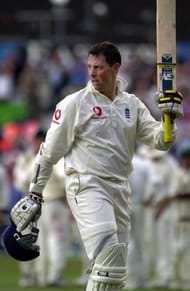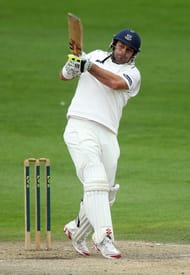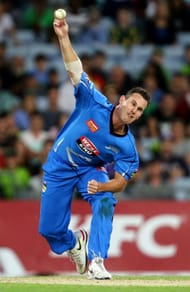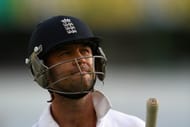Scrape away the glamour, the glitter and the razzmatazz that cricket is known for today, and you will see the dark, grimy layers underneath the game that have been invisible to the naked eye.
It is just a game for the on-lookers. But for those who play it, it is much more than that.
The word stress was very much unknown in the 18th century. For life was much simpler back then. Anxiety, depression – all these did not arrive until much later. The Industrial Revolution needs to take some portion of the blame for that!
International sport requires commitment of the highest order, and demands a lot of sacrifices on the part of a sportsperson. With success comes praise and suddenly, you are thrust into the limelight. It is then that you start worrying about your game, your appearance, your own goals, and the despairing drive to succeed at everything begins to hold you in an iron grip.
Then things start falling apart, and before you know it, the pressure has reached alarming levels.
Cricket, too, has seen its share of players who have had to abandon tours midway just to get rid of all the stress and personal issues that have mushroomed in large amounts.
Here is a list of five players who suffered from such malaise:
Ryan Campbell (Australia)
You would normally associate the word tough with the Australians. But even they aren’t infallible when it comes to handling stress.
Western Australia’s swashbuckling wicket-keeper batsman Ryan Campbell, who represented the national side in two ODIs during the 2002-03 season, recently revealed that he had battled the monster of depression for two years without letting anyone know.
The problem surfaced in 2001, and Ryan was prompt enough to seek medical advice, following which he took anti-depressants for the next couple of years. He never disclosed the use of such medication because he was afraid of ruining his career. A troublesome knee and personal issues, in addition, nearly forced him to quit cricket.
The support of Western Australia’s coach Wayne Clark and his family’s backing helped the wicket-keeper batsman to make a triumphant recovery over his illness. He signed off his first-class career in style, and now uses his experiences to help other sportsmen dealing with similar issues.
Perhaps Jonathan Trott could benefit from Ryan’s experiences.
Marcus Trescothick (England)
For someone who was one of England’s finest openers ever, walking the razor-thin line between being a confident professional cricketer and a vulnerable human being became a little too hard.
Marcus Trescothick was the last person you’d expect to suffer from stress-related anxiety attacks (initially misconstrued as depression).
But when this malady strikes, it does not discriminate between a sportsperson and an average fellow. Trescothick was no different.
He abruptly returned home from the tour of India in February 2006 – it was the first sign of illness that would lead him to call time on his international career two years later. He briefly made a few attempts to return, but realized that the anxiety attacks were getting too frequent.
A packed international schedule, a looming cloud of injuries and intense scrutiny of a cricketer’s life – these were no good for a quick recovery. To make matters worse, he suffered a recurrence of his condition prior to Somerset’s pre-season tour of the UAE, and withdrew from participating in it.
With matters coming to a head, Marcus had no choice but to retire from international cricket and choose to ply his trade at the domestic level.
Inner torment is something that everyone goes through at some point in their lives, but for a sportsperson, it is twice as hard to emerge from. Unfortunately for the England side, it was the beast inside that took Marcus away from them.
Michael Yardy (England)
Depression rears its ugly head at the most inopportune of times. When you happen to be a cricketer who is just about to find his feet in the cauldron of international sport, and are at the peak of your powers, the silent assault by this unseen serpent is enough to shatter you completely.
And picking up the pieces becomes a tedious job.
Sussex all-rounder Michael Yardy, who was an integral part of England’s squad that won the 2010 World T20 crown, felt the first venomous bite when he pulled out of the last ODI against Pakistan in September 2010 – a tour that had been rocked with spot fixing allegations.
As he puts it, he felt, deep down, that he was in a bad place. He was getting angry quickly, burdened by the weight of the high standards he had set for himself.
The pressure on Michael was immense. He began setting unrealistic goals for himself, and would get irritated when he fell short. It got to a point where he would balk at hanging around his teammates.
He was England’s most expensive bowler in the 2011 World Cup group match against South Africa, and that was the final straw. When the entire squad arrived in Colombo for the quarter-final against hosts Sri Lanka, Yardy bolted. He felt trapped in a vicious circle – as he describes it – and yearned for his family back home.
After spin bowling coach and former Sussex teammate Mushtaq Ahmed found out about his issues, he and team director Andy Flower wasted no time in telling Michael to return home for his health.
The all-rounder felt immense relief on the flight back home. He hasn’t played international cricket since then, but the return to county cricket has done wonders for his psyche. The pressure of jet-setting around the world and always striving to be perfect is now gone. He is free, and he is happy.
Shaun Tait (Australia)
One of Australia’s quickest bowlers has also had to face similar issues as the rest of the cricketers on this list. In his case, it was more about struggling to cope with the increasing rigours of the game.
Shaun Tait is the kind of paceman you would love to have in your side. When accurate, he is deadlier than a viper. Bowling at 150 km/hr isn’t easy; it takes a lot out of the strongest. And therein lay the crux of his troubles.
Frequent breakdowns caused by the excessive speed and violence of his bowling action, coupled with an ever-increasing cricketing schedule, led the Adelaide native to utter physical exhaustion. In addition, he was emotionally drained. During the 2008 Perth Test against India, he was under-used by then-skipper Ricky Ponting, and that may have sapped his confidence – he bowled slower than usual, and went wicketless.
He had been battling inner demons for a long time – marketed by Cricket Australia as the nation’s future bowling hope, and the pressure of expectations from the public being two of them – leading to his ultimate breakdown. Enough was enough.
Shaun pulled away from cricket. He went back to work on his basics and sorted out his issues. In essence, he had just stopped enjoying the game, which he realized rather quickly and took steps to correct. He gave up playing Test matches after a while and focused on the shorter formats.
Eventually, he stepped away from ODI cricket after the 2011 World Cup, and continues to play the Twenty20 version in order to keep his body fit and injury-free.
Jonathan Trott (England)
The South Africa-born batsman is the latest unfortunate victim of stress-related issues. The backdrop of his very public exit is the fiercely-contested return Ashes series, and the comments levelled at the Edgbaston number three by the rival camp were just too much to bear.
Trott hasn’t been among the runs recently. Going into a high-voltage clash against the Australians, he probably wasn’t in the best frame of mind. It did not help that speedster Mitchell Johnson dismissed him cheaply in both innings of the first Test. Constant scrutiny into his struggles with the bat in recent times, criticisms in both public and private, and his own personal expectations had to have come to a head at some time or the other.
He has rightly received the kind of support that is absolutely vital for his recovery. The road ahead may be long and full of twists and turns, but I would hope he returns to international cricket as a more relaxed and focused individual.
Not too long ago, he was England’s Mr. Dependable. It’s just a matter of time before Trott returns, and I, for one, would love to see him give a certain Australian left-hander a fitting riposte. Good luck, mate!
Follow IPL Auction 2025 Live Updates, News & Biddings at Sportskeeda. Get the fastest updates on Mega-Auction and cricket news



